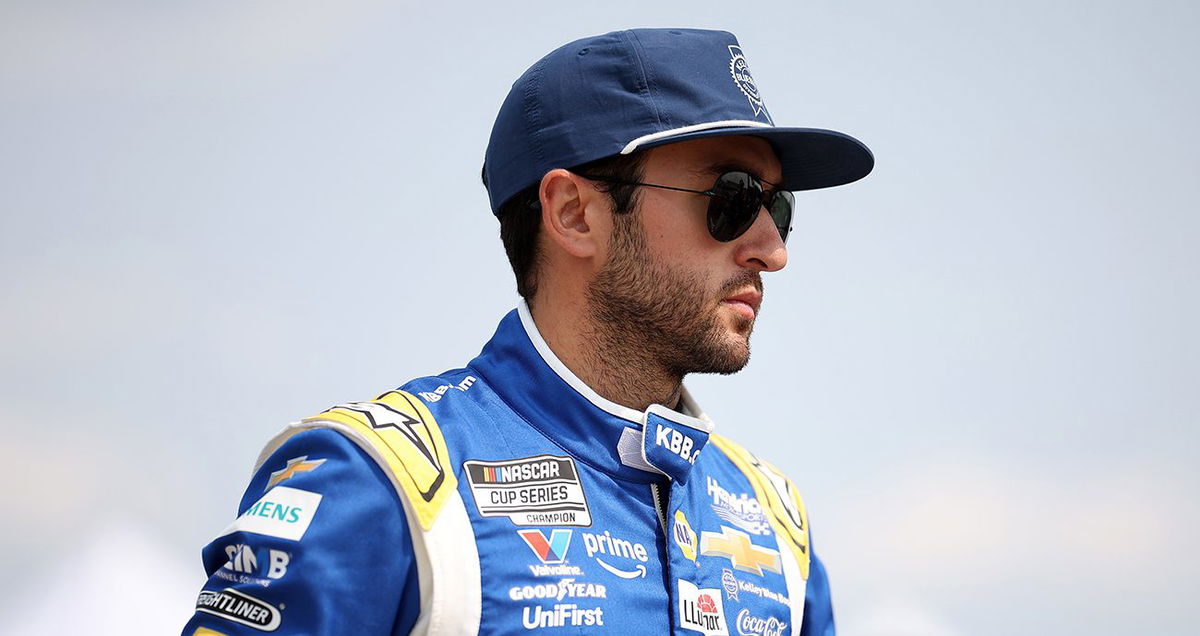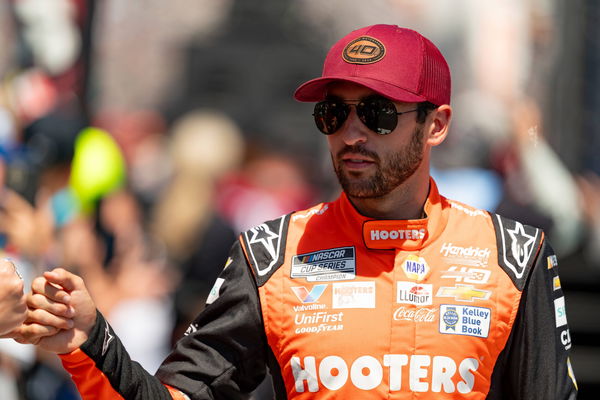
Imago
Holly Cain / NASCAR Wire Service

Imago
Holly Cain / NASCAR Wire Service
This 2025 NASCAR Cup season has delivered fireworks through its first 21 races. William Byron kicked things off by claiming his 2nd consecutive Daytona 500, quickly asserting dominance with multiple stage wins and a commanding points lead early on. Christopher Bell then surged ahead, winning 3 straight races at Atlanta, COTA, and Phoenix, becoming the first driver in the Next-Gen era to do so. Meanwhile, Shane van Gisbergen has emerged as the undisputed king of road courses, sweeping Chicago and Sonoma and tying veteran milestones with 3 wins in 5 weeks. At the top, Denny Hamlin now leads the playoff standings with 4 victories after securing his latest checkered flag at Dover. But, how much has the playoff format truly evolved over the years?
Watch What’s Trending Now!
NASCAR’s playoff system, introduced in 2004, was designed to ratchet up drama by resetting championship contention late in the season. Instead of crowning the champion after 36 races based purely on cumulative scores, NASCAR truncated the title chase to a ten-race “Chase for the Championship,” initially selecting the top ten drivers after 26 races and resetting their point totals to create a tighter race to the end of the season. Brian France introduced new changes in 2007, saying, “The adjustments taken put a greater emphasis on winning races. Winning is what this sport is all about. Nobody likes to see drivers content to finish in the top 10. We want our sport — especially during the Chase — to be more about winning.” While this era created its legends, fans think otherwise after hearing Chase Elliott’s views on the playoff system.
Elliott, despite benefiting from NASCAR’s playoff format to win the 2020 Cup championship, has called for its elimination in favor of a traditional full-season points system. Speaking ahead of the Brickyard 400, Elliott said, “We’ve had a really good and competitive battle to the regular season (championship) over the last two or three years… If you just take that as your sample set over the first 26 weeks, it looks pretty solid to me.” He also added bluntly, “The system would be just fine if you just had a full season (and no playoffs). And if somebody runs away with it, so what? Let’s celebrate the fact that somebody ran away with it, that somebody was just that good… Motorsports does not have to be like everybody else to be successful. And I’ll stand by that till I get done (retires).” These comments make not just fans but also fellow drivers think ‘what could’ve been’ if the system was never introduced.

Imago
FORT WORTH, TX – APRIL 14: Chase Elliott, 9 Hendrick Motorsports Hooters Chevrolet, fist bumps fans before the NASCAR, Motorsport, USA Cup Series Autotrader EchoPark Automotive 400 on April 14, 2024, at Texas Motor Speedway in Fort Worth, TX. Photo by Chris Leduc/Icon Sportswire AUTO: APR 14 NASCAR Cup Series AutoTrader EchoPark Automotive 400 EDITORIAL USE ONLY Icon240413180400
Reflecting on classic years, fans found missed opportunities for season-long drama. In 2004, Jeff Gordon, Jimmie Johnson, and Dale Earnhardt Jr. swapped points leads all summer long, and an epic duel that the current Chase structure diluted. Other seasons followed similar patterns: Johnson vs. Kenneth in 2006, all Chevy/Ford/Toyota battles in 2008 featuring Edwards, Busch, and Johnson; the dominance of Hendrick Motorsports in 200; Gordon’s chase in 2014 for a mythical seventh title; Harvick vs. Logano in the mid-2010s; and Hamlin’s battles in 2019 and 2023. Each offered unique plotlines, and if given full season visibility, they could have gripped fans from February to November. These narratives weren’t just stats; they were stories that unfolded mile by mile, week after week.
Fast forward to now, the playoff picture is clearer but more manufactured. Sixteen drivers have locked in a playoff berth, largely driven by race wins. But fans on social media sites like Reddit and X are truly sorry for having lost out on those compelling, season-long rivalries and storylines that once defined NASCAR. Yes, the format changes alter outcomes, but they don’t change raw speed and consistency. But many believe the sport hasn’t traded up despite the loss of tradition.
Fans echo nostalgia for the old points era.
“The chase robbed Gordon and Harvick the most and helped Johnson and Busch the most. I’m still salty about this,” one fan wrote. For instance, in 2006, despite strong regular-season stats, Harvick dropped out toward the end, while Johnson surged to a championship victory, underscoring how the system elevated late-season performance over overall consistency. In 2013, NASCAR had to controversially expand the Chase field to include Gordon as the 13th driver due to manipulations affecting who qualified, while only 12 drivers were allowed originally. By contrast, Johnson and Busch found ways to peak at the right time under the format, enabling them to win multiple championships even in seasons where they weren’t the dominant force throughout the 26 races.
Another fan added to the sentiment, saying, “I always think it’s funny when people say they want a season-long points format and they love the 2011 battle. Which, without the Chase, Edwards would’ve smoked the field in the title that year.” Carl Edwards entered the 2011 Chase for the Sprint Cup with only one win, but relentless podium finishes and stage performances. By this time, he and Tony Stewart were tied on points at Homestead after 36 races, both 2,403 points, but Stewart’s five Chase victories clinched the championship, despite Edwards outscoring him during the regular season nearly all year. The bias was visible to fans.
One fan also opined, “I sure would’ve loved a 7-time champion Gordon, and honestly, I think the sport would’ve been booming in 2014 if he was the one going for Earnhardt and Petty. I feel like Jeff Gordon and Dale Jr have pop culture clout with non-race fans that Jimmie Johnson doesn’t have. Also, as a Joey Logano hater from Connecticut, I would love for him to have a goose egg just like Denny.” Gordon appeared on numerous high-profile magazine covers from Sports Illustrated to TV Guide and even starred in viral campaigns like Pepsi’s “Test Drive,” boosting NASCAR’s cultural reach. His legendary battles with Dale Earnhardt defined NASCAR’s golden era. That widespread recognition helped sustain NASCAR’s boom into the 2000s. Had Gordon been chasing another championship in 2014, the sport likely would have drawn significant mainstream attention.
In contrast, in the Winston Cup system, drivers could wrap up championships early and even earn real respect from fans. One fan wrote, “Playoffs have no place in motorsports. We don’t need to manufacture artificial game 7 moments every season. If a driver is having a good enough season to clinch the championship 3 races early, then don’t they deserve it? The result of the cur system is that the driver who was the best all season doesn’t necessarily become champion, and people take the championship less seriously.” For example, in 1994, Dale Earnhardt clinched his 7th title with 2 races to spare, pulling away by a massive 448-point margin under the old format. Since the introduction of the playoff era in 2004, the performance metric for the Cup seasons fell from 93% to 44%, meaning the best overall driver often no longer wins the championship. And this change becomes unacceptable for fans.
But that is not the only problem; it is also accompanied by viewership rate drops as compared to Formula One and other motorsports. “People can talk about the recession under Bush, nearly as long ago as the Winston Cup was, all they want when it comes to viewership, sponsorship money and a claim of the death of car culture, but F1 continues to see record highs both worldwide and in the U.S. almost to spite those notions and really should indicate this series needs to self-reflect between this and the car package as the 2025 season continues the previous trends NASCAR has faced of decreasing viewership. It’s difficult to root for a championship when you don’t feel strongly about who ends up champion.”
As Elliott and many fans argue, dwindling viewership and waning allegiance to champions’ outcomes reflect a broader struggle. It is rooted in a system and spectacle that too often leave fans unable to truly care who becomes the champion and losing touch with its traditions.



